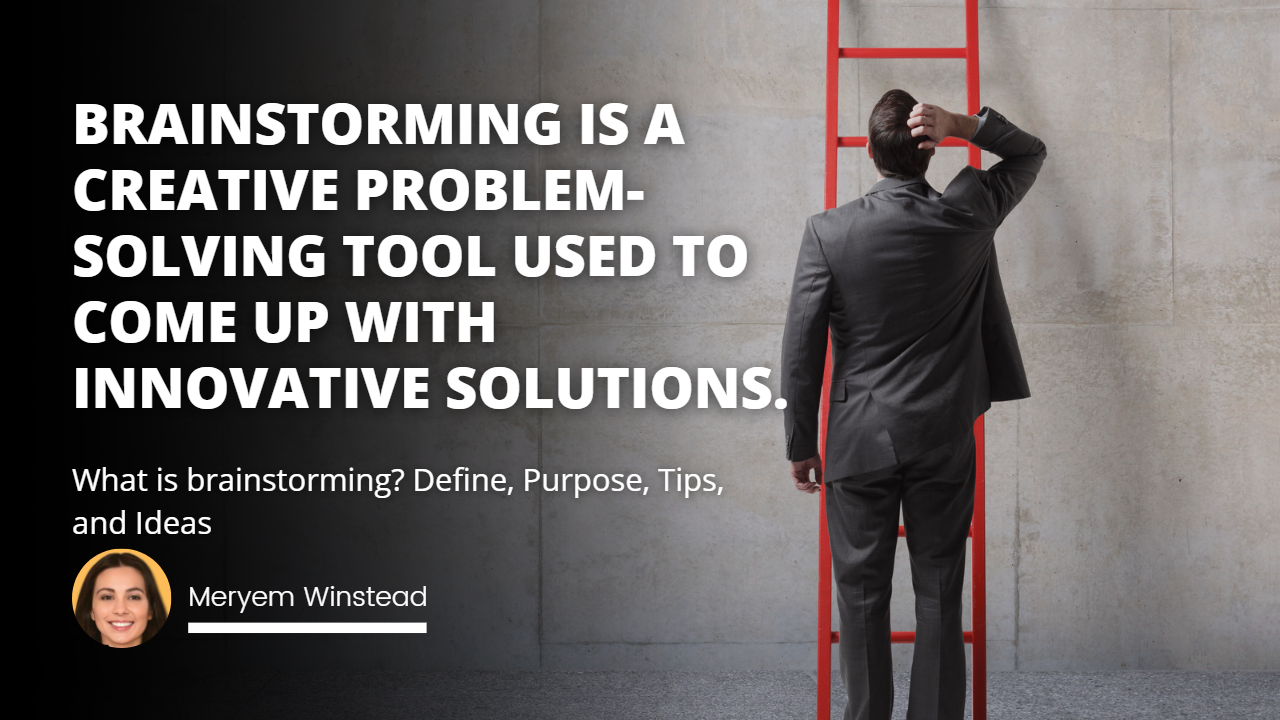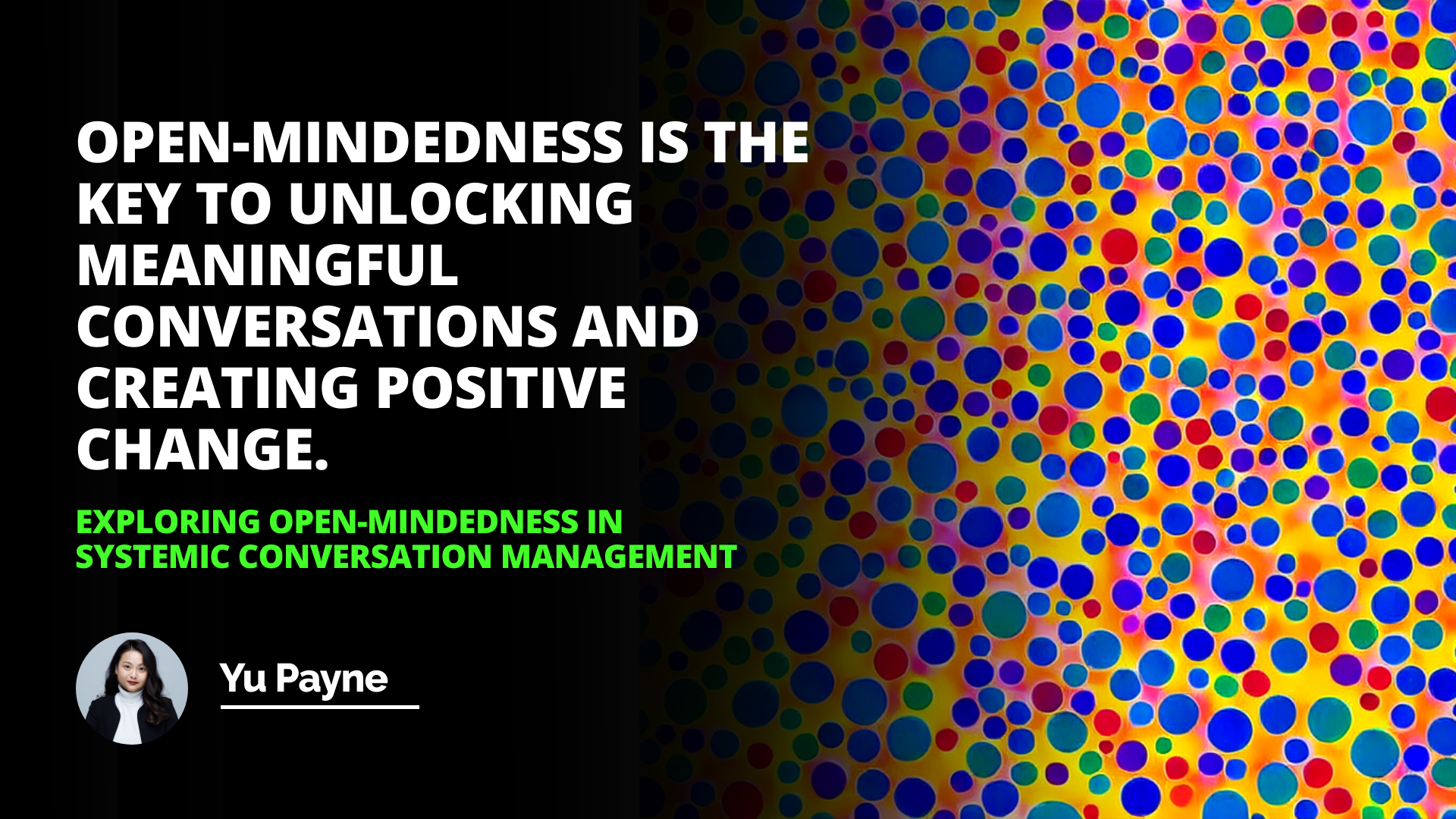
Defining Open-mindedness in Systemic Conversation Management
Benefits of Open-mindedness in Systemic Conversation Management
Challenges of Open-mindedness in Systemic Conversation Management
Strategies for Cultivating Open-mindedness in Systemic Conversation Management
Future Directions for Research on Open-mindedness in Systemic Conversation Management
Open-mindedness is the ability to consider different perspectives without bias, and it is a critical component of successful systemic conversation management. Systemic conversation management, which involves using tools and techniques to manage conversations effectively, requires a high degree of open-mindedness to ensure that all stakeholders have their voices heard and respected. This blog post will explore the concept of open-mindedness within the context of systemic conversation management, focusing on its benefits, challenges, and strategies for cultivating it.
Defining Open-mindedness in Systemic Conversation Management
Open-mindedness is the willingness to consider different perspectives without bias or judgment. In systemic conversation management, open-mindedness is essential for creating a collaborative environment where all stakeholders can actively participate and be heard. Being open-minded allows for more excellent dialogue, leading to more creative solutions and a more substantial commitment to the conversation's outcome. Open-mindedness also encourages stakeholders to be honest and direct in their communication, which can help to avoid misunderstandings and miscommunication.
Benefits of Open-mindedness in Systemic Conversation Management
Open-mindedness can have several positive effects when it comes to systemic conversation management:
It creates an environment of mutual respect, which is essential for effective communication and collaboration.
Open-mindedness encourages stakeholders to be honest and direct in their communication, which can help to avoid misunderstanding and miscommunication.
Open-mindedness can lead to more creative solutions and ideas, as stakeholders will likely consider broader perspectives.
Open-mindedness can help build stronger relationships between stakeholders, improving the overall effectiveness of the systemic conversation management process.
Challenges of Open-mindedness in Systemic Conversation Management
Although open-mindedness can have many positive effects on systemic conversation management, some challenges are associated with it:
It can be difficult for some stakeholders to put aside their personal opinions and consider different perspectives. This can be especially true for stakeholders with strong opinions and feelings on specific topics.
It can be challenging to maintain an open-minded attitude when a large amount of conflicting information or opinions are being discussed.
When one is personally invested in the conversation, the remaining objective can be challenging.
Strategies for Cultivating Open-mindedness in Systemic Conversation Management
In order to cultivate an environment of open-mindedness in systemic conversation management, it is essential to consider the following strategies:
Encourage active listening – Active listening involves actively engaging with the conversation and paying close attention to all stakeholders and their perspectives. This can help to ensure that everyone is heard and respected.
Promote respect – Respect is essential for creating an open and productive environment. Respectful conversations are more likely to lead to creative solutions.
Be open to change – It is essential to remain open to new ideas, even if they differ from one's own. This can help to ensure that all stakeholders are considered and respected.
Avoid assumptions – Making assumptions can lead to misunderstandings and miscommunication. Therefore, challenging one's assumptions and being willing to explore different perspectives is essential.
Maintain a positive attitude – Maintaining a positive attitude can help to ensure that the conversation remains productive and constructive.
Future Directions for Research on Open-mindedness in Systemic Conversation Management
Research on open-mindedness in systemic conversation management is still in its early stages. Future research should focus on exploring the impact of open-mindedness on systemic conversation management outcomes, such as effectiveness, efficiency, and engagement. Additionally, research should focus on developing strategies and techniques to help stakeholders cultivate an open-minded attitude in systemic conversation management.
Finally, research should focus on understanding how open-mindedness can create a more collaborative and productive environment in systemic conversation management.
Openmindedness is the key to unlocking meaningful conversations and creating positive change.
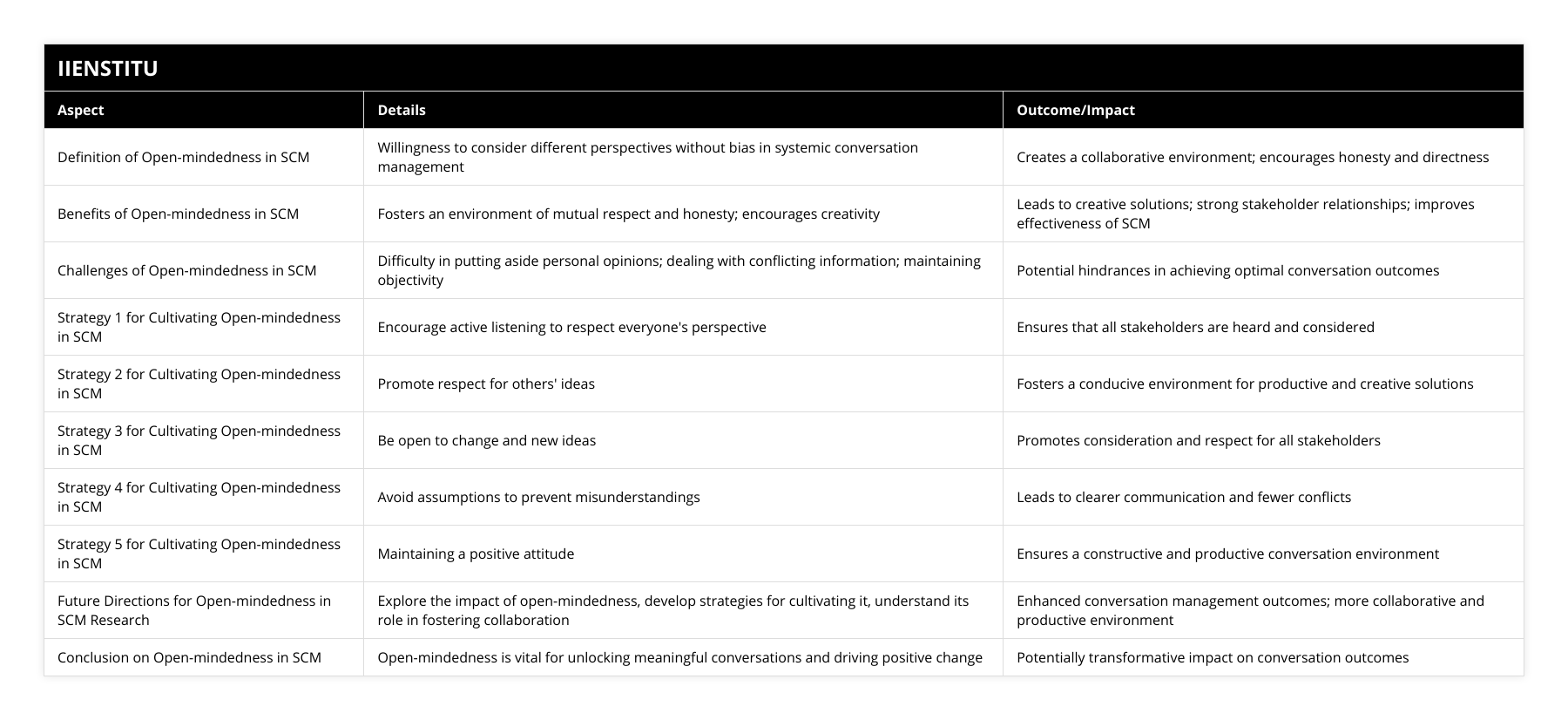
Frequently Asked Questions
What are the benefits of open-mindedness in systemic conversation management?
Open-mindedness plays an essential role in the context of systemic conversation management. This article aims to discuss the benefits of open-mindedness in this area.
First, open-mindedness opens up possibilities for meaningful conversations. It helps foster relationships, allowing people to see things from different perspectives and come to mutually beneficial solutions. By being open-minded, one can better understand the other party's point of view and develop innovative solutions to complex problems. Additionally, it encourages collaboration by allowing all participants to have an equal say in the conversation and preventing one person from dominating or monopolizing the discussion.
Second, open-mindedness allows for more effective problem-solving. By being open-minded, individuals can consider solutions that may have yet to be considered due to bias or preconceived notions about a particular topic or issue. This can help avoid costly mistakes and lead to creative problem-solving that otherwise would not have been possible without such openness.
Third, open-mindedness encourages creativity and innovation in conversations and problem-solving processes within organizations/groups/communities/etc. By allowing for alternative perspectives and ideas to be discussed openly within a group setting, new solutions can be generated, considering various factors that might have yet to be considered due to closed-minded thinking or bias towards specific topics or issues. Additionally, this also encourages individuals within organizations/groups/communities/etc.,to think outside the box and develop innovative ways of tackling complex problems or challenges they regularly face could produce better results than traditional approaches usually employed by closed-off groups of people with similar views on a particular subject matter.
Overall, it is clear that there are numerous benefits associated with open-mindedness in systemic conversation management processes - such as fostering relationships between parties through understanding different perspectives, encouraging more effective problem-solving, and promoting creativity and innovation within organizations/groups/communities, etc. Therefore, it is essential for individuals involved in such conversations - whether they be business owners, executives, or employees - to strive towards developing an attitude of openness toward other opinions to ensure successful outcomes from their conversations.
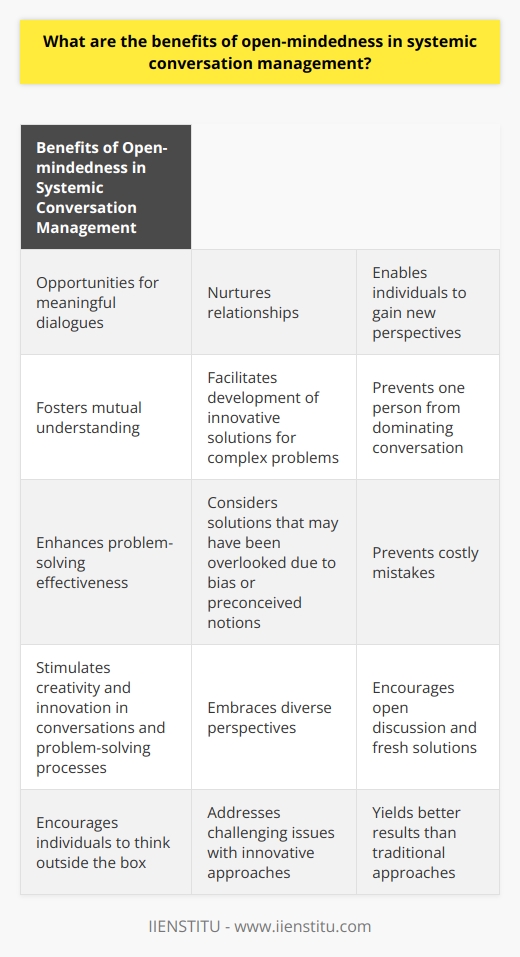
How can open-mindedness be cultivated in systemic conversation management?
Open-mindedness is an essential element of systemic conversation management. It is an approach to communication in which an individual is willing to consider different perspectives, even if they contradict their beliefs. Being open-minded is a critical skill for successful conversations, as it allows for exploring different opinions and ideas, which can lead to a more constructive dialogue.
Cultivating open-mindedness requires a conscious effort to be aware of one’s biases and assumptions. It is essential to recognize that each individual has a unique understanding of the world and that these differences should be respected. In order to foster an atmosphere of open-mindedness, it is essential to actively listen to the other person and try to understand their point of view. This involves being patient and taking the time to ask questions and seek clarification. Additionally, it is essential to remain non-judgmental and to be willing to accept different perspectives without criticism or judgment.
Another critical factor in cultivating open-mindedness is awareness of the power dynamics in conversations. Those in positions of authority or privilege may be tempted to dominate conversations, leading to a lack of open-mindedness. It is essential to recognize that everyone should be able to contribute to the conversation and share their perspectives. Furthermore, those in positions of authority should strive to create a safe environment where all participants feel comfortable expressing their views without fear of criticism or judgment.
Finally, it is essential to practice empathy when engaging in conversation. Empathy involves actively attempting to understand the other person’s perspective and demonstrating respect and appreciation for their opinion. Taking the time to consider the other person’s perspective can help foster open-mindedness, allowing for a more respectful and constructive dialogue.
In conclusion, cultivating open-mindedness in systemic conversation management is essential in fostering constructive conversations. It involves actively listening to the other person, being aware of one’s biases and assumptions, and practicing empathy. By creating a safe and respectful atmosphere, everyone involved in the conversation can contribute their perspectives and engage in meaningful dialogue.
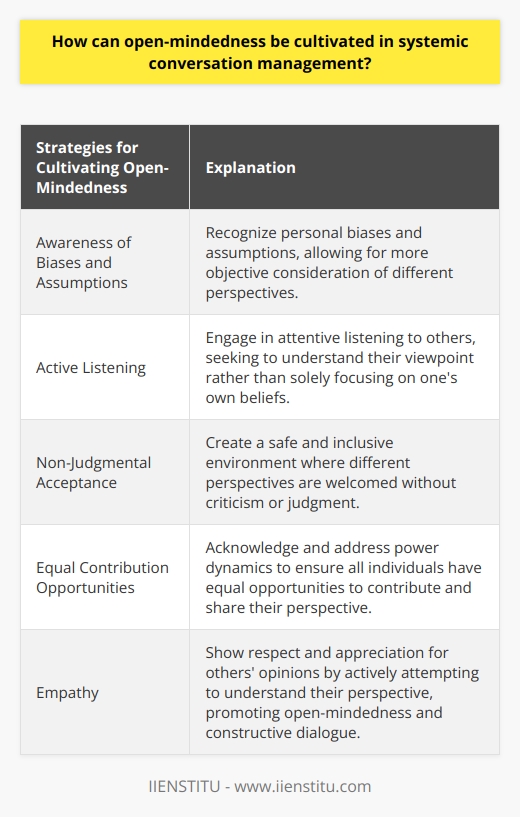
What is the importance of open-mindedness in systemic conversation management?
Open-mindedness is a critical component of successful systemic conversation management. Systemic conversations involve various stakeholders and perspectives, and this complexity requires an openness to different ideas and approaches. Open-mindedness encourages collaboration, understanding, creativity, and problem-solving. It enables participants to explore alternative solutions, understands opposing perspectives, and develop mutually beneficial solutions.
Open-mindedness is essential for systemic conversation management because it allows stakeholders to identify the underlying issues in their conversations. By consciously considering the other’s perspective or point of view, stakeholders can better understand the factors driving the conversation and identify potential solutions that meet everyone’s interests. This ability to think critically about conversations can help participants move beyond surface-level topics to more meaningful discussions about underlying needs and objectives. Additionally, an open-minded approach encourages mutual respect between all parties involved in the conversation, which facilitates more effective communication.
Open-mindedness also allows for greater engagement from all stakeholders in systemic conversations. When all parties feel respected and heard, they are more likely to actively participate in discussions rather than listen passively or remain silent out of fear of being judged or criticized. This active participation increases understanding on both sides. In addition, it creates an environment where ideas can be exchanged freely without fear of repercussions or judgment, allowing for better problem-solving capabilities within the group dynamic.
Finally, open-mindedness is essential for systemic conversation management because it helps foster innovation by encouraging out-of-the-box thinking from all involved parties. By considering different approaches or perspectives, stakeholders have access to a broader range of ideas which may lead to creative solutions that could not have been achieved if they had remained stuck in their ways of thinking or limited by their own biases or beliefs. This increased creativity enhances problem-solving abilities, leading to improved outcomes for all involved parties and improved relationships between them over time due to shared success stories resulting from those creative solutions found through open-minded conversations and collaborations.
In conclusion, open-mindedness plays a crucial role in successful systemic conversation management by allowing for greater understanding between stakeholders and fostering creativity and innovation, which leads to better outcomes overall. Furthermore, open-minded conversations encourage mutual respect among participants while creating an environment where ideas can be exchanged freely without fear of judgment or criticism, thus facilitating collaboration that results in shared success stories and strengthening relationships over time.



